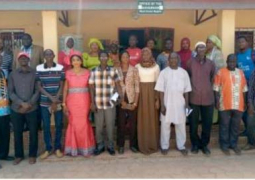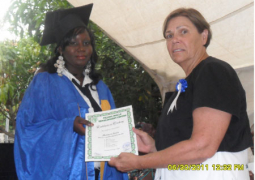
Readers
and watchers of news recently, would recall the reasons of many Gambian
migrants rescued by Italian rescue boats, on why they risked their lives in the
Mediterranean for better life in Europe. It is now a common occurrence to see
an obviously grateful but rescued Gambian migrant reeling off reasons why
he/she fled The Gambia for the shores of the west in search of the proverbial greener
pasture and freedom from Yahya Jammeh’s Islamic State.
It
seems despite His Excellency Sheikh Professor Dr Alhaji Yahya Jammeh’s
best efforts to appear to be doing something to turn The Gambia into West African Singapore and have Gambians stay
and make it in their own country ,Gambians are
still migrating or shall I say
fleeing en-masse like never before seen in the history of The Gambia.
Building
The Gambia’s first ever University is a good thing, building roads and
supplying villages and towns with electricity and pipe-borne water like my
native Gunjur is even a better thing.
However,
we have electricity and it is erratic these days and getting worse by the day.
Human rights violations and lack of the independence of the Judiciary and corruption have gotten
worse. And, inexplicably, the exodus of
Gambians – intellectuals and non-intellectuals, skilled and unskilled, brains
and brawns – is puzzling. What is more, the destinations and means by which these
Gambians immigrate are no longer just the U.K. and the U.S. or even by flight.
To my utter consternation and surprise, Gambians are now immigrating to South Africa, SouthKorea,Thailand,Dubai,Italy,Argentina,Mauritania,Algeria,Morocco,Western
Sahara, Ghana, Nigeria, Antigua, Guyana, Trinidad& Tobago, Hong Kong and
even Mexico. You may be surprised to know that Gambians are notorious for being
the biggest drug dealers in Hong Kong. Hardly does a day go by without me
getting a call from a classmate or friend stuck in Libya or Agadez asking for
some help to cross into Libya or pay for a boat to Italy.
From
my research at the time of writing this article, until the late 70s Gambians
left mainly for the U.K. to study. Once they graduated, they returned home,
obtained employment either in the civil service or the private sector, obtained
a car, maybe a Volkswagen Beetle, or
Volkswagen and settled down to a blissful life.
Majority
of those who left in those days were children of the rich whose parents had the
money to sponsor them. Others were lucky enough to win scholarships to Sierra
Leone and Nigeria like the currently jailed Gambian opposition leader and
freedom fighter Lawyer Ousainou Darboe. In either case, they went abroad on
student visas and knew that a job was waiting for them at home once they
graduated. So, while in the U.K. they lived the life of a student. If they had
a part-time job, it was only to supplement whatever stipend they received from
their parents or sponsors. If they had a fiancé or fiancée before traveling, in
most cases, the lovers were rest assured that the relationship would lead to
fruition.
But
today’s travelers or semesters as they are mostly called in The Gambia are of a
different stock. Since I left The Gambia
about half a decade and a year ago I have met few Gambians who went to the U.K./US, obtained their degree
and returned home almost immediately. In many years of being in the
U.S., I have never met anyone who just came here to study and returned home. I
have a cousin who tells me every year that he is packing his bags and getting
ready to go home but it has since been six years and he is still in America. In
fact, most of the people who now travel abroad do so to find work. If they
study (and many do), they settle down here and swear never to return to The
Gambia except on vacations or after retirement. Those who do not study also
settle down and swear never to return to The Gambia except on vacation. Why is
it the case that many Gambians do not want to return home?
The
answers to the question apart from the state of human rights and economic
situation at home have their foundation in the truism that it is easier to
leave Africa and The Gambia particularly than to return to re-settle there
permanently, in spite of whatever anguish you endured before obtaining your
visa. When you left The Gambia, probably some 10, 15, 20, or 30 years ago, you
were by yourself. You had only one luggage; no wife and no children. You were
in your mid- to late- 20s. If life was pretty bad for you, you were in your
30s. Your friends were around your age. You lived with your parents or other
relatives. And if you were not that lucky, you rented your own place. Your
friends also either lived with their parents, relatives, or rented their own
places. You didn’t have a car; and if you did, it was a jalopy. Now fast
forward to 30 years later. Forget about the 10, 15, or 20 years listed above,
for it would take you about 30 years to attain any semblance of meaningful
living either in the U.K. / U.S. or anywhere in the West if you did not win the
lottery and you were not a drug dealer.
As
you plan to return to The Gambia, the fact that it is easier to leave Gambia
rather than return to it hits you smack in the face. Do you have a place of
your own to which you could return? If you do, does it meet the standard of
living befitting of a person who had lived overseas for 30 years? What would
you do for a living in The Gambia? Get a job in the civil service? Get a job in
a private corporation? Start your own business? Is your wife (if you are a man)
Gambian? Is she a black foreigner? Is she a Caucasian? Is she Hispanic or
Asian? Does she have the qualifications
to work or do business in The Gambia? What about the children? If you spent 30
years abroad, your oldest child is probably 25 years old and out of college. Is
the child returning with you to Gambia or staying back in the U.S? (The child
is probably staying back in the U.S.) If you spent 30 years abroad having left
Gambia when you were about 30 years old, what sort of thing could you do at the
age of 60 to earn a good living in Gambia? How exactly do you re-enter the
Gambian work force at the age of 60? And those friends that you left behind 30
years ago; where are they now? Surely, some have now graduated from Gambia
University and gone abroad to do their masters and quickly return home to their
positions after graduation, some are now managing directors. Others are now
very senior civil servants. Yet others are now university professors like my
friend Ensa Touray who never left the shores of the Gambia but got all his
education at Gambia university (actually a Masters’ degree) and doing well as a
history professor .And oh, since it is the era of politics, some are now
legislators, special advisers, and ministers and senior magistrates and judges
like my friend from Nusrat High school Omar Jabang who graduated from Nusrat 6 years ago at the same time I
did. You might even find a few who are governors! You must question where you
stand in the society.
Of
course, successfully returning to Gambia and re-integrating yourself into the
society is contingent upon the fact that you had been visiting the country on a
regular basis in the past 30 years ( I go at least once every year and loved
it). How easy have those visits been? When, since you first traveled, did you
begin to visit Gambia? Two, five, 10 years? It depends. It depends on when you
“normalized” your stay. It depends on when you obtained a resident permit,
otherwise known as the green card. How did you obtain that green card? Well,
let’s see.
Thirty
years ago, you could not have earned a visa lottery, because there was no
lottery system. You either traveled on a student visa or a visitor visa. If you
have parents living in the U.S., they could apply for an immigrant visa
(another form of resident permit) for you. But if you traveled on a
non-immigrant visa (student or visitor visa), the most likely route available
for you to “normalize” your stay was to marry a U.S. citizen. It sounds pretty
simple right…marrying a U.S. citizen? Well, not only is it not that simple, it
is also illegal to marry someone just for the purpose of normalizing your stay.
What right thinking woman (or man, as the case may be) would want to marry
another person for fraudulent reasons? This is not to say that people did not
do it (or are still not doing it), but you can be very rest assured that that
“marriage” would be the worst nightmare of your life. True marriages in the
U.S. already break at about 50 per cent rate in the first two years. And these
are marriages between Americans who share the same culture. Now, throw in a
fake marriage between a naturally “over-bearing” and “chauvinistic” Gambian,
African man and a naturally “liberated” American woman, and you may have
concocted a recipe for matrimonial disaster. My own marriage unraveled just
after a year but I was lucky enough to still keep my green card despite being
divorced with my temporal green card years ago.
While
your fake marriage inches on (it takes about two year sometimes to obtain a
green card and another three years to obtain American citizenship), you find
yourself a job, a menial job. You would still take a menial job as a
construction worker, a taxi driver (I used to be a cab driver before I become
rich), a newspaper vendor, a security guard, a floor and toilet cleaner, a
landscaper, a fast-food cashier, a baggage handler at the airport, a greeter at
a hotel, a dish washer, or a bus boy (one who clears the table at restaurants).
Name the menial job, that’s what you’ll get as a new-comer to the U.S. With the
green card you acquired at about your 6th or 7th year in the U.S. (if you are
fast and seductive enough), you will
remain at the bottom level of that menial job unless you return to school here
and get trained in some other vocation or profession. Nursing is one of the
favorites among Africans, however I prefer real estate and establishing your
own business.
One
of the good things about being a green card holder, or a citizen, is the fact
that you could obtain financial aid in the form of loans, and even grants (you
don’t have to pay back grants), in order to pay for your education and sundry
issues. Remember, nothing is free in America. In America of today, you will
have to cough up anything from $20,000 – $50,000 (annually) in university education
cost. It should be no surprise to you that 25 years after graduating, you are
still paying back that loan.
So,
during the time you are paying back your student loan, it stands to reason that
you are probably also paying back your car loan. If you have lived in this
country for 12 years and have not owned your own house, other Gambians,
especially in materially obsessed Gambian immigrant hubs like Seattle, Atlanta and Minneapolis begin
to look at you funny because your rent will be around the same amount you would
pay in mortgage if you owned the house. Why not buy then? Depending on your
credit rating and taste, you will borrow hundreds of thousands to purchase a
house. So, at some point in your life, you will owe student loan, car loan, and
mortgage at the same time. Payments on these are usually due every month.
Unlike The Gambia, you will also have to pay for gas and electricity. Lord help
you if you have a phone because, along with your gas, electricity, and water
bills, your phone bill is also due every month.
Did
I mention already that you would have a wife and children too? Well, along with
those monthly utilities bills are the daily (if not hourly) non-specified,
unexpected bills to be paid on the children. Whereas in your village, you could
send your wife to her parents and your children to their uncles and aunties for
help, here, you are basically on your own. Gah!!
And as you grapple with balancing your checkbook by taking a second job,
you get word from your village that your mother is ill; or niece or nephew just
secured admission to The Gambia university and you begin to curse why that
Dictator Yahya Jammeh built a university and didn’t make it tuition free in the
first place. You look at your bank account and you find just enough money to
pay your bills at the end of the month (or no money at all because you just
paid your bills); you decide to ignore the call from home because
self-preservation is a sacred order. But your conscience keeps knocking; you
remember that Dad had to sell part of his farm to see you through school in the
village; you remember that mom spent countless nights in the hospital when you
were dying of malaria like my mom did for me when I was admitted at RVTH for 6
month in 1996. I actually watched Jammeh’s first inauguration after being voted
to power in the parlor of the RVTH hospital with other recovering patients; you
remember that your best friend who has now joined the chorus of people needing
money back home contributed his last towards your visa fees. Even if you wanted
to lie to them that you were broke, you couldn’t make a convincing case; what
about that picture you sent home showing you in front of a huge house with two
nice cars in the garage? What about that picture of you, your wife, and
children standing in front of the fireplace in a well-furnished living room?
What about the picture of you guys at the park, in the pool, at the beach,
playing around as if you have no worries? What about that last time you visited
The Gambia and convened a meeting of the entire village at the village Bantaba
, where you doled money out to everybody, including those that did not even
ask? Now you are in a quandary; conscientious but broke. You weigh all your
options: do any of the problems require your physical presence in The Gambia?
Or could you just borrow more money and send home? If you send money home, how
much is too much; how much would reinforce the erroneous notion in the mind of
your folks that you are rich?
You
consider the totality of your life in the U.S. – the fact that at 60, you are
still taking the trash out; you are still washing your own car; you are still
washing your own clothes; you are still sweeping and vacuuming your own house;
you are still mowing your own lawn; you are still doing groceries. You consider
the fact that for 30 years you really did not make any real friends here.
Somehow, you just found yourself holding more to the friends you left in Gambia
rather than make new ones here with all the drama, gossip and fake smiles. .
At
work, you find out that you have reached an impenetrable glass ceiling. Your
employers will not promote you anymore because…er…you look different and speak
different, even though you remain the most valuable expert at the office. You
find yourself in a rot, doing the same thing over and over for years. So, you
seriously consider returning to The Gambia. You make a “wetting the feet” visit to The Gambia, smartly
testing the water before taking the plunge. People tell you that owning your
own house before coming home is a no-brainer. You start to look for a piece of
land. Lord helps you if you are lucky as land is becoming more and more
expensive thanks to infrastructural development and uncontrolled population
growth
Anyway,
you find a plot of land in, say, Brufut, Bijilo, Gunjur, Sanyang, or Tujereng .
You jump through the hoops to obtain ownership of the land and draw up a
building plan. Now, are you going to remain in your village until the house is
completed or are you going to return to your base in US/UK? Of course, you will
have to return to your family and job abroad while your house is being built.
Are you going to hand the construction of your house over to a friend or
relative? Lord helps you if someone else is monitoring your house construction
for you. You can be sure to pay twice what it should normally cost you for the
construction of that house. And it may not even be without structural defects!
I for one thank God that my brother did an amazing job with the house I
built in my native Gunjur and didn’t over
charge me.
After
building your own house, you now return to the questions raised before: when
and how do you leave the U.K. or the U.S. for The Gambia? What would you do for
a living in The Gambia? You then begin to think about the whole idea of leaving
Gambia in the first place. Was it worth it at all? Yes, it may have given you
an initial leg-up when you left, but has not the law of “diminishing returns”
set in? The family and friends you left in The Gambia, some of whom you used to
send money, did not remain in the same place you left them. You find out that
they, too, have gone to Gambia University and got their bachelors and master’s
degrees, have built their own homes. If they are in the civil service, they
have accrued a substantial retirement benefit. If they are in the private
sector, they have also put away enough assets for retirement years. All of them
have attained positions of authority and influence and have contributed to the
growth of their communities one way or the other. Their children have obtained
university education and have gone on to bigger and better things. Your family
and friends have done all these without leaving The Gambia except on vacation
or refresher courses abroad. They have achieved so much while enjoying the
cathartic effect of being around childhood friends and extended family members.
And
as you weigh this question, your nephew calls from The Gambia and asks for
assistance in immigrating to the U.K./US.
You ponder and grappled with the question: should you tell him that it
is not worth it? If you did, would he not accuse you of not wanting him to do
“as good as you have done”? You decide you will just give him enough of the
pros and cons and leave him to make the decision. And you pray that he decides
to stay home and keep looking for that job or maybe enroll in a program at The
Gambia University then get a better job afterwards and stay home happily ever
after.





